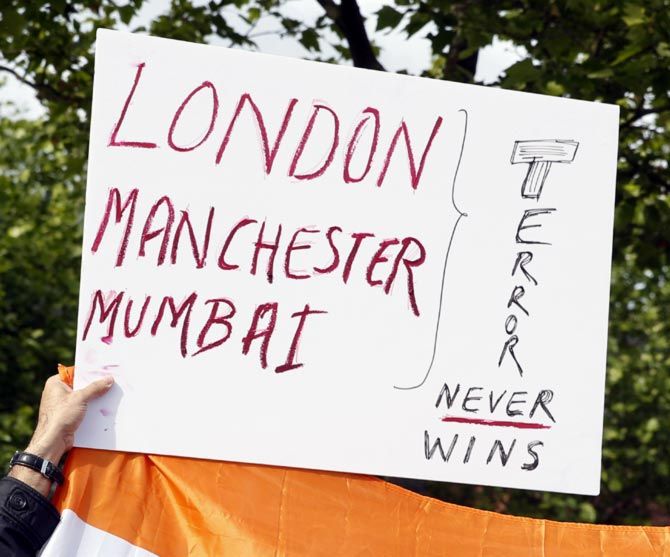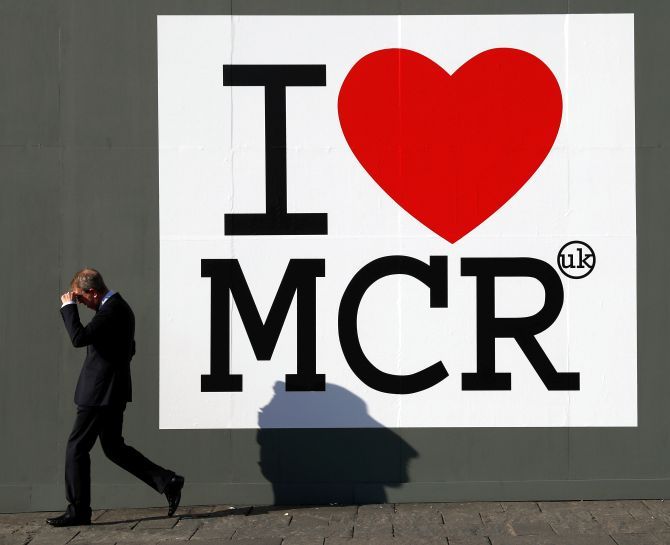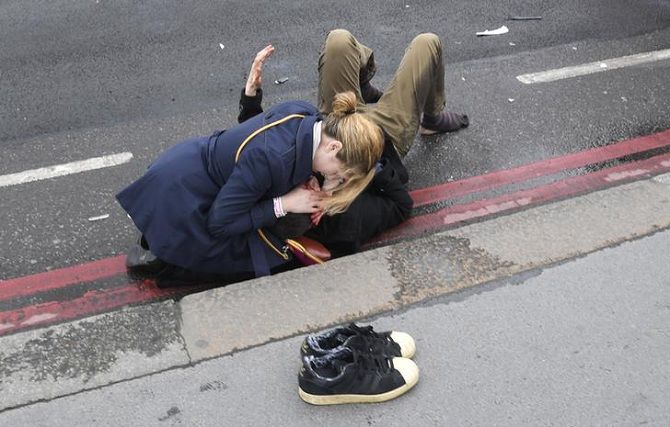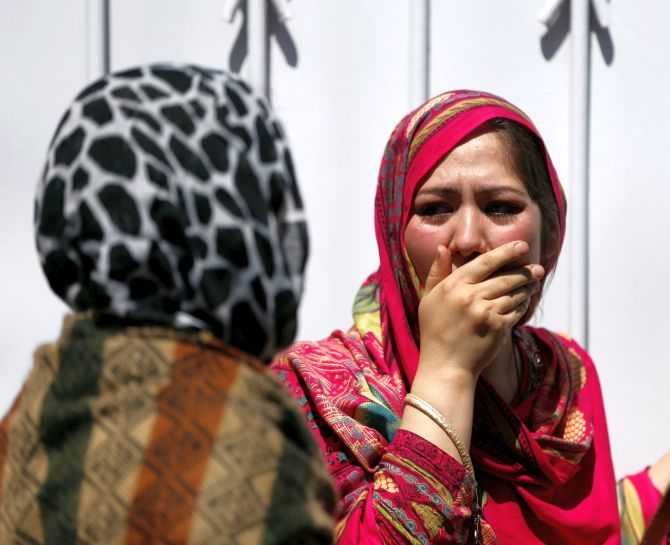'A series of arrests have illustrated that IS now has a footprint in India.'
'India has been, for a very long time, a key part of Al Qaeda's global jihadist ambitions.'

Dr Rashmi Singh, is the professor of International Relations at Brazil's PUC Minas. A former lecturer in Terrorism Studies at the University of St Andrews in Scotland, she is an expert on terrorism -- you can read her earlier interview: 'Terrorism is also a social activity'
"It is significantly harder to identify high-risk or radicalised individuals in society as opposed to groups propounding an extremist ideology. The challenges to fending off lone wolf terrorism is formidable, but not unsurmountable," Dr Singh tells Rediff.com's Archana Masih in an e-mail interview.
In carrying out terror attacks by using methods like mowing down pedestrians by car and selecting even more vulnerable targets (children at a pop concert) -- is the face of terror changing?
The face of terrorism has been changing from the very minute terrorism emerged.
Terrorism is the deliberate use of violence to spread fear to an audience that extends well beyond the immediate victims of this violence -- all for a political goal.
Therefore, from the very moment of its inception terrorism has mutated to best accomplish these political goals.
This has historically meant that the tactics of terrorism have adapted to advantageously exploit new technologies, materials and mediums.
For example, bombings only emerged and evolved with the widespread availability of explosives like TNT.
Similarly, hijackings emerged with the rise of television which guaranteed these events would be given round the clock coverage.
However, with each shift the methods and protocols for countering terrorism have also evolved, making it difficult for terrorists to continue using the same methods and materials without significant innovation.
That is partly what we are seeing with the recent attacks in the United Kingdom.
Innovative ways of using existing technology for terroristic purposes.
In addition, the expansive and totalitarian ideology of transnational terrorist groups like Al Qaeda and Islamic State are founded upon a sophisticated narrative of the victimisation of Muslims in the Middle East and other parts of the world.
This attracts individuals who may not share the exact same set of beliefs as these organisations, but are sympathetic to the plight of the Muslim umma.
Add to this, the fact that the narrative of these transnational groups increasingly encourages personal initiative as a mechanism to address the victimisation of Muslims.
What results is a scenario in which already disenfranchised and disenchanted individuals gain access to a narrative that essentially legitimises the use of whatever means they may have at their disposal to conduct attacks in the name of an abstract, expansive and totalitarian ideology.
What new challenges does it throw up for security and intelligence agencies? Especially, when deadly lone wolf attacks can cause large-scale mass murders?
The key challenge for authorities lies in the ability to be able to locate and monitor high-risk individuals.
However, when it comes to doing so there are several challenges.
First and foremost, it is significantly harder to identify high-risk or radicalised individuals in society as opposed to groups propounding an extremist ideology.
We need to accept that no matter how competitive our security and intelligence agencies are, they will be unable to locate a 100% of such individuals in society.
This is especially true if these individuals stay under the radar -- they are uninvolved in any sort of criminal or gang activity.
Having said that, there are also individuals who participate in terrorist activity who may have already been tagged by police and intelligence services for other minor transgressions.
For instance, in a recent case in the United States the extreme right-wing terrorist and white supremacist Jeremy Joseph Christian stabbed three men.
Christian not only had a long history of violence but he also had a police record, albeit no prior convictions.
This leads to what is the second key challenge for security and intelligence agencies, -- limited resources.
In other words, even in scenarios where an individual may have been identified as high-risk given limited and scarce resources it is extremely difficult to monitor them till the point a crime or terrorist attack is committed.
No police force or counter-terrorism agency has limitless resources and the resources that exist tend to be overstretched.
This is significant because it is a well-established opinion amongst experts that the most effective counter-terrorism intervention is that of community policing -- however, in an age of financial crises and budget cuts this makes the already challenging task of our police and intelligence forces that much more difficult.
Finally, there are also challenges involved in inter-agency intelligence sharing and processing.
We know for instance that Salma Abedi (the Manchester bomber) was known to MI5 (the British domestic intelligence agency), but not being actively investigated.
He was also not on the radar of the prevent anti-extremism scheme. However, many of these challenges can be effectively addressed and managed.
In short, when taken together, the challenges to fending off lone wolf terrorism is formidable, but not unsurmountable.

Is it possible to carry out an attack like this alone?
There is still not enough evidence that Salman Abedi, the Manchester bomber, was in any which way linked to a terrorist cell although some claims have been made that there is a Manchester-based terror gang with which he was affiliated.
Similarly, police have thus far asserted that Khalid Masood, the perpetrator of the Westminster attack, was also acting alone.
In short, in both cases here there is no real evidence of any clear links with an established terrorist organisation or a cell thereof.
In terms of if these attacks are possible to plan and enact alone there is a palpable difference in the tactical sophistication between the two.
In the case of Masood, certainly it is possible to ram a car into pedestrians without much training or technological know-how and solely based upon a deep belief in a particular ideology and/or narrative.
However, in the case of Salman Abedi, the very fact that he used a suicide bomb suggests not only the fact that he had bought into a radical ideology, but also that he had, at the very least, some more contact with the technical know-how required to build and detonate an explosive device.
Thus far, reports suggest that several members of Abedi's local community had reported him a few times via the police's anti-terrorism hotline for his extremist and violent views.
One can argue that to some degree Salman's radical stance may have been the result of online access to extremist material or a personal grievance against Muslim victimisation in the Middle East, especially vis-a-vis Syria and the humanitarian crisis in Libya.
We also know that Abedi travelled to and from Libya where his father Ramadan had purportedly become involved in fighting against (Muammar) Gaddafi's regime.
It is thus also quite possible that Salman may have picked up his bomb-making skills during one of his visits to Libya.
However, if this is indeed the case and whether he had any ties to terrorist groups in Libya is still to be confirmed by security services.
Abedi was of Libyan descent and had recently returned from Libya. What terror connections do radicalised youth from Manchester have with Libya?
Manchester is, according to some reports, a key centre of Libyan politics in the UK.
Some of this is do with the fact that it has a large Libyan community including individuals who were Gaddafi's political opponents and thus granted asylum from his murderous regime in the 1990s.
During Gaddafi's reign in Libya, Manchester remained a key space for Libyan exiles, especially Islamist opponents of various hues.
When the civil war in Libya started, a significant number of the individuals in Manchester as well as other parts of the UK travelled back to Libya to take part in the revolution against Gaddafi.
It has been reported that British intelligence agencies were not only aware of this, but may have also encouraged members of the community to participate in the overthrow of Gaddafi to meet their own foreign policy objectives.
Indeed, several media outlets have reported that British intelligence facilitated travel for many Islamists from Manchester back to Libya at this time.
As a result, a significant number of Islamists left Manchester for Libya.
Manchester also appears to have emerged as a key fundraising centre for the Islamist war efforts in Libya.
Initially British intelligence did not view the Libyan community or their participation in the revolution against Gaddafi to be a threat.
However, in the years since the fall of Gaddafi's regime, as Libya has become host to a number of terrorist groups including Islamic State, this perception of threat has evolved.
Moreover, younger Libyans are more vulnerable to being not only more radicalised, but also tend to be less discerning when it comes to ideological distinctions between the groups they may choose to affiliate with.
It is worth remembering that individuals like Abedi may have grown up in Manchester, but Libya was never far away.
Not only would they have heard the stories of their family's suffering, but also stories of how the devout Muslims of Libya were brutally persecuted by Gaddafi's regime.
Thus, not only were they exposed to the suffering of the Muslim umma, but they also had close family and friends involved in fighting in Libya.
In many ways, these individuals straddled two worlds where on the one hand they lived in the West, but simultaneously tended to be exposed to a revolutionary ideology and had close friends and family who were directly involved in violent revolt against Gadaffi's regime.

Are places frequented by young people becoming more vulnerable?
Not particularly. Terrorists choose targets that are vulnerable, easily accessible and symbolic.
It would be an overstatement to argue that terrorists are particularly targeting spaces frequented by young people.
It is much more accurate to say that terrorists are targeting vulnerable spaces some of which also happen to be more frequented by young people.
How will this alter security, especially outside stadiums and arenas, because security personnel are stationed inside these precincts and not outside?
Not really. At the end of it -- the presence of security is not sufficient in and of itself.
If you have a bombing attack or an active shooter scenario, the mere presence of security will do absolutely nothing.
In the first case, the security will be as helpless as civilians; in the second case unless security is trained and armed and more significantly, willing to risk civilian casualties in a fire fight, again there is not much it can do.
What is required is a much more rigorous vetting process for individuals to go through before entering large scale arenas such as stadiums and concert arenas.
So where security might alter is in a tightening of checks outside these spaces.
Has the ISIS vision of capture of territory and its promise of an Islamic Caliphate that drew radicalised young Muslims -- has that threat diminished?
Or has it now moved to different countries and in different forms?
This is not an easy question to answer.
IS needs to be placed in context of its roots in Al Qaeda.
This will allow us to understand the power of the narrative that AQ first constructed and then promulgated.
Islamic State has essentially adopted the same narrative with minor differences -- of course, the key being the control of territory.
However, while undoubtedly we have individuals who were drawn to IS because of the fact that it controlled territory, this neither accounts of all of IS' recruits nor does it explain why they continue to attract support despite the losses they are suffering on the ground.
The threat has by no means diminished.
Like in Afghanistan after the Soviet jihad and then again after Operation Enduring Freedom, the result of routing IS will be that a radicalised, highly skilled group of individuals who are connected with a transnational network of fighters with whom they share powerful bonds of kinship and share experiences will move out of Syria/Iraq to either go home or join and act as force multipliers in other conflicts.
In short, the threat will disperse and mutate instead of disappearing.

What threats from ISIS or other adherents of jihad should a country like India be concerned about?
The threat of Islamist terrorism emerges from transnational organisations like Al Qaeda and Islamic State.
Various Al Qaeda documents mention the importance of waging a jihad against the persecution of Muslims in Kashmir and India more broadly.
India has been, for a very long time, a key part of Al Qaeda's global jihadist ambitions.
Al Qaeda's current leader Ayman al-Zawahiri announced the formation of the group's newest regional branch, Al Qaeda in India, AQIS, in September 2014.
More recently, a series of arrests have illustrated that IS now also has a footprint in India.
Thus far, IS has been making strategic use of social media for its propaganda in order to draw support from both individuals formerly associated with local terrorist groups, such as SIMI and IM, as well as other unaffiliated individuals.
Since June 2014, several young men have also reportedly travelled to Syria and Iraq to fight for IS.
Thus, it is more than evident that the spectre of global jihad does indeed threaten India.
How is terrorism going to further change the way we live our lives? Laptops, I-pads, tablets have already been banned from cabin bags on many flights. What are some of the things we will likely have to give up for our safety?
This is very hard to answer. But in this age of transnational terrorism we will certainly have accept heightened security measures will be a part and parcel of our daily lives and travels.











 © 2025
© 2025